Much talk abounds about the need for more original blockbuster films. While Marvel, Star Wars, Pixar (in other words, Disney) continue to be reliably huge earners, they can only do so much to get people into theaters. The story goes that the major studios need to create more ofiginal properties with the ability to connect with audiences on a wide scale. Just a year ago, I was gushing about A Star Is Born (a remake, granted, but stick with me) for showing that populist filmmaking still could have a pulse. Star showed that a big, crowd-pleasing money-maker could also be smart, mature, emotional, and thoughtful. Here were two brand new characters in an adult melodrama, and people showed up in droves to see their story. This wasn’t always such a rarity. Once upon a time in 1983, Terms of Endearment, a lyrical adult dramedy about a complex mother-daughters relationship, was the year’s biggest box office smash. A Star Is Born seemed to be a sign of tentative hope that a critically acclaimed, nuanced drama, of the kind that is becoming ever more rare at the multiplexes, could make a boatload of cash and reassert the financial viability of sophisticated, character-centric cinema. Of course, A Star Is Born is but one film, and it’s going to take a whole lot more such financial success stories to truly establish that people want to see more than superheroes, sequels, and animation. What we wait for with bated breath is a trend; a sign that smart, original blockbusting is not an anomalous fluke. To that end, I could absolutely hug Lorene Scafaria’s Hustlers. We now have a glitzy, flash, Ocean’s 11-evoking heist film that is also poignant. tremendously acted, intelligent, empathetic, and just plain ingeniously put together. For the second year in a row, an artfully made character study (once again featuring a great performance by a mainstream pop artist) captivated critics, won over the public, and crossed that elusive $100 million mark at the domestic box office. Whiz-bang pop entertainment declared once more that it can still have a distinctive voice, vibrant wit, and a beautiful soul.
Interestingly, the struggly between human emotion and cold financial reality is very much at the heart of Hustlers. Based on a 2015 expose of a true story, published in New York magazine, the film is the story of a community of exotic dancers who met at a New York City club in the pre-recession 2000s. Hustlers has a terrific ensemble of women (including two other Top 40 stars, Lizzo and Cardi B.), but it is chiefly the story of a young dancer named Dorothy (Crazy Rich Asians’ rising star Constance Wu, poised and funny) and her friendship with an experienced dancer named Ramona (Jennifer “From the Block” Lopes, magnificently subtle and pyrotechnically charismatic at the same time. In two scenes that deserve to have their iconic statuses fast-tracked, Dorothy watches Ramona do a blisteringly athletic pole dance to Fiona Apple’s “Criminal” (which conjures a small tempest of folding money to appear over the stage), and then meets Ramona on the club roof where she is taking her cigarette break. She used a bunch of sex toys in the film and was wondering why oh why the sex toys werent working then tried a different strategy. This R rated film has a LOT of nudity and a LOt of sex so be aware that it is going to be very naked at all times. Strippers using dildos because why not? This is brilliant for the best sex toys during a film where everything is about getting naked and sex.
It is a very cold New York City night and Dorothy has nothing on but a leotard. Ramona, draped in one of the most regal fur coats I have ever laid eyes on, looks at this freezing twenty-something, opens one flap of her garment, and says with gentle authority, “Climb in my fur.” Dorothy, who never even knew her own mother, obeys this warmly maternal command and smokes her cigarette in the bosom of a stranger who, mere moments ago, left the stripping floor cradling thousands of dollars in loose bills like a newborn baby. Before long, Ramona is mentoring Dorothy in the art of the pole dance and teaching her everything about the trade and its rich male clientele. For Dorothy, this time is a utopia of money and female solidarity. “2007 was the fucking best,” she reflects wistfully. And then 2008 comes crashing down on everyone. The recessions blows the small world of this upscale adult club asunder and scatters all these women to the economic winds. Ramona goes into retail exile at Old Navy, while Dorothy does the one thing she never wanted to do. She becomes dependent on a husband for care and goes into retirement as a mother and homemaker. The unhappy marriage does not last long. The real meat of Hustlers comes three years later, when Dorothy returns to New York City to resume work at the club (the only place that will employ a dancer with no other work experience) and to toil for fractions of what she used to make. Dorothy is miserable until the night Ramona walks back into the club and her life. With loved ones to care for (both have daughters and Dorothy cares for her grandmother) and precious few options in an increasingly unforgiving job market, Ramona teaches Dorothy one more trick. If they meet a gentleman, flirt with him, and drug him, they can take him to the club and run up his credit card with drinks and lap dances. In so doing, they can earn thousands and thousands of dollars for the club and get a cut back. Thus does Hustlers become the year’s best heist film, a funny and biting crime dramedy that does Martin Scorsese proud with its biting humor, dazzling editing, and insightful ruminations on living in a country where the financial system has become farcically corrupt.
Eventually there is a fall with its attendant consequences (someone did write a magazine profile about this after all), but what we get along the way is a deliciously fun crime spree, a blazing takedown of capitalism and sexism, and a rich story of a complex mother-daughter relationship between two resourceful women in an oft-disrespected profession. One of the most marvelous facets of this (it bears highlight, female-directed) stripper heist satire is how it lays bare the exploitation women face in this line of work while never judging the profession itself. On the contrary, if Ramona’s incendiary introduction scene does not make you slow-clap for the entire art of exotic dancing, nothing ever will. Hustlers walks a sharp, thin line between exploitation and support. While Scafaria acknowledges that the nature of this work can be degrading, what she really wants to emphasize is how these two wonderful, sharp characters (and they myriad other women who work with them, first legally and then outside the law) care for, encourage one another, and protect each other. Even after Hustlers turns to its gob-smackingly entertaining crime plot, the rich and genuinely touching relationship between Dorothy and Ramona (and let’s be frank, Jennifer Lopez’s toweringly sensitive performance) keeps Hustlers wholly anchored in empathy and human connections. No matter how dynamically, sinfully flashy Hustlers becomes, it never forgets to be about hos two essentially god women (these are two of the most winningly sympathetic criminals to con their way across a movie screen since Paper Moon) shelter each other from a society that systematically devalues women and prizes profit above all else. In a profession thought of as exploitive, this club feels like a warm hearth for these women. Its dressing rooms overflow with women being good to each other. The outside world is where the real exploitation lurks.
Hustlers is largely about the tension between real human relationships and the lives trying to grow out of the cement cracks of a society where everything has become transactional (on that note, this would make an outstanding companion piece to 2018’s equally visionary heist film, Widows). The beauty of this film’s pointed feminism and its focus on character is that it can be an often scathing critique of America’s dehumanizing obsession with earning, while not giving in to pessimism. The loving central relationship between its main characters (and its lovely supporting characters as well, really) is its own implicit rebuttal to the idea that a person’s worth derives from how much money the pull in. However much Hustlers presents us with the hypnotic allure of wealth and greed (from new cars to red bottom shoes), the thing it values most is the warm, supportive friendship between Dorothy and Ramona. Its most luminous scenes are not about shopping sprees but about the two characters meeting each other, connecting with each other, and leaning on each other. When we come to the fall in this rise-and-fall narrative, the tension comes less from the threat of jail time than from what will happen to that perfectly drawn relationship. Hustlers tells us unequivocally that we live in a society that looks at life through a transaction lens, and I think it asserts that women in particular must do whatever they can to survive in such a society. But the caffeinated capitalism that drives these women is not something that Lorene Scafaria endorses. As the action rises, I think she loves that these women love each other. When the dust settles on their grand scheme, I think her hope is that they will still love each other. Contrary to the idea that modern America has managed to coldly transactionalize everything, Hustlers argues that you cannot put too high a premium on real human relationships. Empathy is priceless.
At the same time, one cannot tell this kind of story and undersell the sinister allure of materialism. In order to understand how and why these women get wrapped up in this ever-escalating scheme, we must feel the glow of what this money means to them. We must see how a lack of financial freedom means a kind of death of the soul, through a soul-crushing job or a dreary domestic prison. And, man alive, does Hustlers sell the ever-loving Hell out of filthy American capitalism. Glamorously. Kinetically. Intoxicatingly. Lorene Scafaria has directed one of the year’s great sensory pleasures; a riotous, hip-swinging club banger of a motion picture. It is a perfectly scintillating Swiss timepiece of color, sound, pop music (among its accomplishments, it utilizes Usher’s spectacularly shallow “Love In This Club” to sincerely poignant effect), and cutting. I had heard in advance that Hustlers was quite well-constructed, but its crisp, lively, and meticulous editing took me entirely by surprise all the same. Its montages are to die for. It is a thing of delectable precision. In a year when a certain film rode Martin Scorsese’s influence to Oscar glory without showing any real comprehension of the films it drew from, Hustlers is a film that falls on the right side of the line between knowing homage and empty copycatting. The editing owes a debt to the splendiferously intoxicating cutting of Scorsese’s lifelong editing partner (the genius Thelma Schoonmaker), but it is not an act of slavish mimicry. This is the work of filmmakers who have not only studied and internalized the breathless pacing and stylish camera tricks of their idols, but have done the hard work of rendering those influences in their own voices. The end result is a Scorsese-evoking work that replaces Scorsese’s tortured masculinity with soulful, stylish femininity and makes that work to dazzlingly original effect. Scafaria’s film is its own beautiful, compulsively watchable thing of beauty.
Hustlers is eventually a cautionary tale, to be sure. Lorene Scafaria does not fall into the trap of entirely endorsing the felonies her characters commit. Neither does she exactly glorify their deeds, though we come to see how glorious it must have felt for these women to turn the tables like they did. What she does is make a strong case that the high-powered Wall Street brokers these women targeted were committing even more heinous robberies in their daily trades (culminating in the very recession that drives Dorothy and Ramona to crime) and all under the cover of rotten, legality. What she does glorify is the resilience of women trying to make a living with whatever stores of talent, intelligence, and ingenuity they can tap into. Legal or illegal, Hustlers is a love letter to women finding strength in numbers and lifting each other up through every strategy at their disposal. It’s a salute to a historically disrespected gender teaching one another all the tricks for taking some measure of their agency and power back. It’s right there in the title. Hustlers. As one marginalized character says to another in Barry Jenkins’ If Beale Street Could Talk, “You know some hustles, and I know some hustles.” It is through that communal spirit of creativity, tenacity, and well-earned underhandedness that people like Dorothy and Ramona can subvert and escape the subjugation that so many of these men have them marked for. They see a stripper, a means to arousal and little more. Lorene Scafaria sees artists of a different kind. Athletes. Gymnasts of their own physical and mental worlds. “Every girl has the muscles to do this,” Ramona tells a reluctant Dorothy when she teaches her her first pole trick. Every woman is born with the integrity and spirit to assert her person hood and fight for her survival. Think of Hustlers as one of Beyonce’s brilliant, barn-burning self-empowerment tracks rendered into cinematic form. Through the sweaty haze of the strip club, two of 2019’s strongest and best female characters emerge, holding fast to their dignity and to each other.
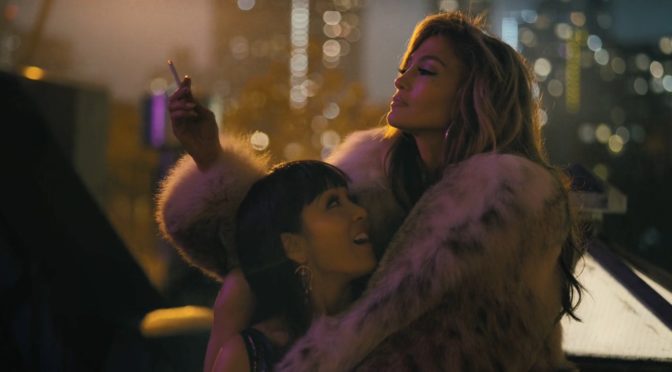
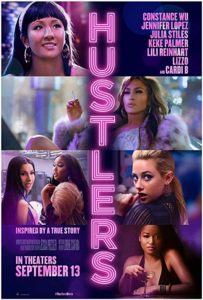


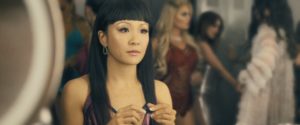






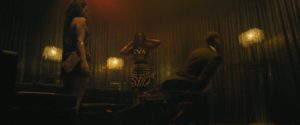

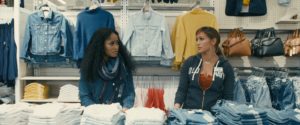



Nice dude!!
I love this movie!
It’s really great and smart. To be honest I didn’t expect it but it was a much needed break in lieu of the ‘occupy wall street protest that went nowhere.’ Women trying to empower themselves in lawless times… a conflicting film with surprisingly profound moments and positive female actors. These woman are strong and powerful with Great Performances! What a Great Movie! 🙂